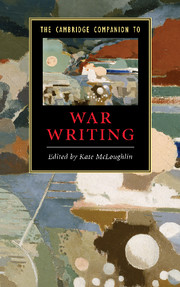Book contents
- Frontmatter
- Introduction
- Part I Themes
- Part II Influences
- Part III Poetics
- 8 Medieval warfare
- 9 Early modern war writing and the British Civil Wars
- 10 The eighteenth century and the romantics on war
- 11 American Revolutionary War writing
- 12 The Victorians and war
- 13 The American Civil War
- 14 The First World War: British writing
- 15 The First World War: American writing
- 16 The Spanish Civil War
- 17 The Second World War: British writing
- 18 The Second World War: American writing
- 19 American writing of the wars in Korea and Vietnam
- 20 The Cold War and the “war on terror”
- Index
19 - American writing of the wars in Korea and Vietnam
from Part III - Poetics
Published online by Cambridge University Press: 28 January 2010
- Frontmatter
- Introduction
- Part I Themes
- Part II Influences
- Part III Poetics
- 8 Medieval warfare
- 9 Early modern war writing and the British Civil Wars
- 10 The eighteenth century and the romantics on war
- 11 American Revolutionary War writing
- 12 The Victorians and war
- 13 The American Civil War
- 14 The First World War: British writing
- 15 The First World War: American writing
- 16 The Spanish Civil War
- 17 The Second World War: British writing
- 18 The Second World War: American writing
- 19 American writing of the wars in Korea and Vietnam
- 20 The Cold War and the “war on terror”
- Index
Summary
Korea as a rehearsal for Vietnam
Although different in important respects, the wars in Korea (1950-53) and Vietnam (1965-73) had much in common. Both were Cold-War conflicts conceived as limited, non-nuclear wars to halt the spread of communism, and both resulted in heavy losses: in Korea, some 36,000 US troops died; in Vietnam, 58,000. Other parallels extend beyond these statistics: before the wars began, both Korea and Vietnam, through international agreement, had been partitioned into a communist north and a US client-based south, making both countries potentially combustible. The outcome of the two conflicts was the opposite of what America and its allies intended: at the time of writing (2008), North Korea remains a nuclear-armed communist state ruled by a despot, and the Socialist Republic of Vietnam continues to be a united communist nation whose relations with the USA were normalized only in 1995.
In both wars, the USA was taught a traumatic lesson in the new realities of warfare as its advanced technology proved insufficient to achieve victory in either the cold, mountainous terrain of Korea or the paddy fields and jungles of Vietnam. US military theorists remained fixated on conventional war as fought on the battlefields of Europe, and its politicians too often ignored low troop morale and motivation. In these two remote Asian wars, the American public, after an initial period of enthusiasm, soon grew disillusioned, and US soldiers found it increasingly difficult to believe in the causes they were supposedly fighting for.
- Type
- Chapter
- Information
- The Cambridge Companion to War Writing , pp. 226 - 238Publisher: Cambridge University PressPrint publication year: 2009



